First, we are grateful for those who subscribe to our BookNotes newsletter.
(You can easily do so at the Hearts & Minds website by entering your email address if you’d like. Our BookNotes and our special discount offers will come to your inbox about once a week.)
We are especially grateful when we get good feedback and lots of orders (the point of this bookselling biz, of course) for books we commend.
(You can order almost anything by telling us what you want at our secure order form – just click on the “order” or “inquire” links at the end of this column and follow the prompts.)
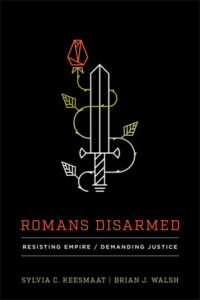 Last week’s BookNotes review was a long, complex overview of the breathtakingly vital, very important (and not a little controversial) Romans Remixed: Resisting Empire/Demanding Justice by Sylvia Keesmaat & Brian Walsh (Brazos Press – regularly $26.99; our sale price = $21.59.) Reading this book will help you understand your Bible better and help you gain a better vision for dedicated Christian living in these trying times. In my review I insisted that it is one of the best books of the year, certainly one of the most stimulating, informative, and compelling Biblical studies books I’ve read in years. They use a variety of teacherly devices to help us understand what life was like under the debased and violent Roman Empire and how revolutionary Paul’s letter was in the ears of the first hearers. Far from an abstract theological document about atonement theory and predestination and personal salvation so we know who goes to heaven, it is a manifesto about unity and inclusion and justice and stewardship and God’s Kingdom coming as Christ is increasingly seen as Lord – a political phrase in those years. If Christ is King we can resist the false machinations of the current fake empires, live in ways more subversive to the idols of that age and, quite practically, filled with this humble goodness that comes from God’s grace, we can welcome others into the safe home that God’s people themselves are becoming. This is potent, missional stuff, directly inspired by a close reading of Romans.
Last week’s BookNotes review was a long, complex overview of the breathtakingly vital, very important (and not a little controversial) Romans Remixed: Resisting Empire/Demanding Justice by Sylvia Keesmaat & Brian Walsh (Brazos Press – regularly $26.99; our sale price = $21.59.) Reading this book will help you understand your Bible better and help you gain a better vision for dedicated Christian living in these trying times. In my review I insisted that it is one of the best books of the year, certainly one of the most stimulating, informative, and compelling Biblical studies books I’ve read in years. They use a variety of teacherly devices to help us understand what life was like under the debased and violent Roman Empire and how revolutionary Paul’s letter was in the ears of the first hearers. Far from an abstract theological document about atonement theory and predestination and personal salvation so we know who goes to heaven, it is a manifesto about unity and inclusion and justice and stewardship and God’s Kingdom coming as Christ is increasingly seen as Lord – a political phrase in those years. If Christ is King we can resist the false machinations of the current fake empires, live in ways more subversive to the idols of that age and, quite practically, filled with this humble goodness that comes from God’s grace, we can welcome others into the safe home that God’s people themselves are becoming. This is potent, missional stuff, directly inspired by a close reading of Romans.
 As I explained, Romans Disarmed book fits well within the decades of work and witness and writing Brian and Sylvia have done. They are a bit rare — academics who publish in the finest scholarly journals who work an organic farm, stewarding it well with old ways and some innovative permaculture approaches. (And they have animals and heirloom tomatoes and do workshops on all kinds of homesteading skills.) Plus, they have served among the homeless in Toronto, done campus ministry with college students, have mentored young adults in starting social service ministries and justice-seeking businesses. (Check out this video about 541 Eatery for instance; the house manager was an intern at Russett House Farm and Brian supervised his Masters thesis in theology at Wycliffe College.)
As I explained, Romans Disarmed book fits well within the decades of work and witness and writing Brian and Sylvia have done. They are a bit rare — academics who publish in the finest scholarly journals who work an organic farm, stewarding it well with old ways and some innovative permaculture approaches. (And they have animals and heirloom tomatoes and do workshops on all kinds of homesteading skills.) Plus, they have served among the homeless in Toronto, done campus ministry with college students, have mentored young adults in starting social service ministries and justice-seeking businesses. (Check out this video about 541 Eatery for instance; the house manager was an intern at Russett House Farm and Brian supervised his Masters thesis in theology at Wycliffe College.)
 In case you missed it, I noted that Brian and Sylvia did a previous book in this same creative genre – an amazing, potent, radical, application-oriented (conversational) creative commentary called Colossians Remixed: Subverting the Empire (IVP Academic; $28.00; our sale price at 20% off = $22.40.) In that column I named some of their other books as well.
In case you missed it, I noted that Brian and Sylvia did a previous book in this same creative genre – an amazing, potent, radical, application-oriented (conversational) creative commentary called Colossians Remixed: Subverting the Empire (IVP Academic; $28.00; our sale price at 20% off = $22.40.) In that column I named some of their other books as well.
Which is all just a way of saying that their broad intellectual and life influences, their years of research and writing and their fruitful leadership has made them into the sorts of authors we want our customers and friends to know about. Agree fully or not with this robust new (or is it ancient?) reading of Romans from the margins, it is one you should read.
We hope you are glad for this advice from us here at the shop (even if it is a hard adventure further up and further in.) You most likely aren’t going to hear about this book in the evangelical bookstore chains or the secular mega-stores. We would be honored if you ordered it from us.
It pleases us greatly that we have had the pleasure of shipping a bunch of these out this past week. Romans Disarmed, we think, might now be our best seller of 2019 (which, given our small scale, isn’t saying that much, I realize.) We don’t have the exact numbers but it is vying with Fleming Rutledge’s Three Hours: Sermons for Good Friday (Eerdmans; $18.00; our sale price = $14.40) as a bona fide Hearts & Minds bestseller!
Rev. Rutledge has an excellent book of sermons on Romans as well, called Not Ashamed of the Gospel: Sermons from Paul’s Letter to the Roman (Eerdmans; $22.00; our sale price at 20% off would be $17.60.) It would make an ideal companion – more conventional, but powerful, eloquent, and inspiring. She has deepened her own positions on Pauline teaching in her more recent, award-winning, nothing-short-of-magisterial The Crucifixion: Understanding the Death of Jesus Christ (Eerdmans; $30.00; our 20% off sale price = $24.00.) I wasn’t kidding when I said in that BookNotes review that I’m hoping that some of our best Paul scholars – Fleming Rutledge, Tom Wright, obviously, and friends like Michael Gorman will weigh in on Romans Disarmed. I suspect that they would have much in common and a few significant differences, and a bunch of quibbles about exegesis text by text by text.
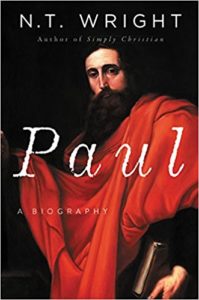 There have been a lot of books on St. Paul, lately. Those of us who don’t read a lot in this field may not know it, but it is stimulating to find the various scholars who are helping us solve our problems with Paul. Of course, we have raved about the novel-like biography of Paul colorfully written by N.T. Wright called Paul A Biography (HarperOne; $29.99; our 20% off sale price = $23.99) and we highly recommend it.
There have been a lot of books on St. Paul, lately. Those of us who don’t read a lot in this field may not know it, but it is stimulating to find the various scholars who are helping us solve our problems with Paul. Of course, we have raved about the novel-like biography of Paul colorfully written by N.T. Wright called Paul A Biography (HarperOne; $29.99; our 20% off sale price = $23.99) and we highly recommend it.
Here are a few others:
- Four Views on the Apostle Paul edited by Michael Bird (Zondervan) $19.99
- Reading Paul Michael Gorman (Cascade) $22.00
- Paul: An Apostle’s Journey Douglas Campbell (Eerdmans) $22.00
- The Apostle Paul and the Christian Life: Ethical and Missional Implications of the New Perspective edited by Scot McKnight & Joseph Modica (Baker Academic) $26.00
- Preaching Romans: Four Perspectives edited by Scot McKnight & Joseph Modica (Eerdmans) $20.00
- Paul’s Non-Violent Gospel Jeremy Gabrielson (Pickwick) $26.00
- Why I Love the Apostle Paul: 30 Reasons John Piper (Crossway) $14.99
- The Mind of the Spirit: Paul’s Approach to Transformed Thinking Craig Keener (Baker Academic) $29.99
- Paul and His Recent Interpreters T. Wright (Fortress Press) $39.00
- Reading Romans with Eastern Eyes: Honor and Shame in Paul’s Message and Mission Jackson (IVP Academic) $20.00
- The Damascus Road: A Novel of Saint Paul Jay Parini (Doubleday) $27.95
For any of these, we’ll deduct 20% off the regular retail price, which we show above. Send us an order if you’re interested. Or email, asking for other suggestions…
We need serious evaluations of Romans Disarmed from the Biblical guilds and scholars and theologians and preachers but we also need reviews “from the margins” or at least those in the trenches. Does this book equip those who are doing front-line Kingdom ministry “kicking at the darkness”? If you are working to alleviate the injustices of our day – the crass militarism, the sexual abuse, the way the Trump administration is undoing environmental policies, the raging hostility against immigrants and the apathy towards refugees and such – I’d love to know if Romans Disarmed helps. I think it will.
If you are a campus minister or youth worker or one who hangs out with those who are on the fringes of faith; that is if you are an evangelist or friend of the un-churched, I wonder how this can help you share the gospel more faithfully? I think the way Brian and Sylvia interact and reply to the good questions their fictional interlocutor raises would be very helpful to model healthy conversations.
Or maybe you are feeling a bit stuck these days, maybe in a safe and solid suburban life, with a bit of privilege and a conventional understanding of God’s grace as explained in Romans, but you’re seeking something more, something to pull you out of the doldrums, the churchy routine, the too-often uninspiring devotions. Know anybody like that? Know someone who maybe needs a shift in perspective and some renewed energy to move deeper into Christian discipleship? If you need to have your world rocked a bit, Romans Disarmed will shake some truisms you thought you knew and push you into some wild waters. Hang on, and go for it. It could save your life!
+++
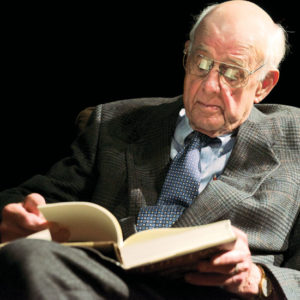

One of the significant influences on Brian and Sylvia – starting years ago – has been the potent cultural criticism and refreshing agrarian worldview of farmer/poet/novelist/public intellectual Wendell Berry.
Rather than merely reminding us not to spend so much on consumer goods and pressing us to avoid plastics and toxic junk, they (channeling Berry) invite us to a stewardly vision of life, rooted in a sturdy view (and a quite Biblical view) of creation.
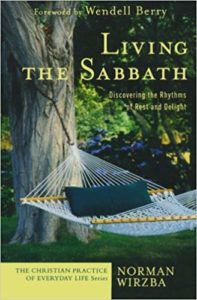 Practical books come to mind as helpful resources for more simple living like Nancy Sleeth’s delightful and very inspiring Almost Amish: One Woman’s Quest for a Slower, Simpler, More Sustainable Life (Tyndale; $14.99 – our sale price = $11.99) and wise, profound books like Norma Wirzba’s Living the Sabbath: Discovering the Rhythms of Rest and Delight (Brazos Press; $20.00; our sale price = $16.00) and A.J. Soboba’s Subversive Sabbath: The Surprising Power of Rest in a Nonstop Road (Brazos Press; $19.99; our sale price = $15.99) which are exceptionally helpful to shore up the Christian lifestyle proclaimed as good news in Romans Disarmed.
Practical books come to mind as helpful resources for more simple living like Nancy Sleeth’s delightful and very inspiring Almost Amish: One Woman’s Quest for a Slower, Simpler, More Sustainable Life (Tyndale; $14.99 – our sale price = $11.99) and wise, profound books like Norma Wirzba’s Living the Sabbath: Discovering the Rhythms of Rest and Delight (Brazos Press; $20.00; our sale price = $16.00) and A.J. Soboba’s Subversive Sabbath: The Surprising Power of Rest in a Nonstop Road (Brazos Press; $19.99; our sale price = $15.99) which are exceptionally helpful to shore up the Christian lifestyle proclaimed as good news in Romans Disarmed.
All of these books – some of our favorites – have (at least) one big thing in common. They not only perfunctorily quote Berry (nearly a requirement in some hip circles these days) but they take his work seriously, they read him deeply, they actually commit themselves to “practice resurrection” taking cues from creation and new creation, law and prophets, wisdom and gospel, and the “Manifesto: The Mad Farmer Liberation Front” poem.
If you want to deeply understand Walsh & Keesmaat you not only have to read uber-texts like Dooyeweerd and Goudzwaard, Wright’s New Testament and the People of God and Brueggemann’s The Prophetic Imagination and anything written by J. Richard Middleton (not to mention listening to the albums of Bruce Cockburn) but a whole lot of Wendell Berry. A whole lot of Wendell Berry.
Who doesn’t love his fiction, such as the popular Jayber Crow and Hannah Coulter? What great stories they are, lovely, calm, mature, wise, and perfect for summer reading. We just received the re-issue edition of the previously out of print short story collection The Wild Birds: Six Stories of the Port William Membership (Counterpoint; $16.95; our sale price = $13.56.) We hope you have at least a few of his poetry collections. But to understand Wendell Berry’s impact on so many of us, and how his work has influenced Romans Disarmed, you have to study his serious non-fiction essays and his several long-form books.
BRAND NEW LIBRARY OF AMERICA EDITIONS OF WENDELL BERRY ESSAYS
 It brings us great delight to announce the release this past week of the prestigious Library of America’s simultaneous publication of two handsome, sturdy cloth hardbacks (expertly bound with high quality, acid-free paper, Smyth-sewn binding, even ribbon markers) of some of Wendell Berry’s most significant essays.
It brings us great delight to announce the release this past week of the prestigious Library of America’s simultaneous publication of two handsome, sturdy cloth hardbacks (expertly bound with high quality, acid-free paper, Smyth-sewn binding, even ribbon markers) of some of Wendell Berry’s most significant essays.
As with a rock star’s boxed set compilation or “best of” double-album collection, fans will endlessly debate why this piece wasn’t included or why that work wasn’t honored. Let the arguments commence for those fans that are true Berry aficionados. For most of us, we need a reliable introduction, a good, well-chosen collection and these are almost perfect. There are other introductions – The World-Ending Fire: The Essential Wendell Berry (Counterpoint; $16.95; our sale price = $13.56) just came out in paperback and isn’t bad, although it is missing some vital stuff, and the great Wirzba-edited Art of the Commonplace: The Agrarian Essays of Wendell Berry (Counterpoint; $15.95; our sale price = $12.76) is very nice, but specifically oriented to (as the subtitle denotes) his farm-oriented, agrarian writings.
So these new, handsome Library of America editions are wonderful and fill a real need for those wanting such a good collection.
There are three ways to buy them. There is volume 1, offering work from his earlier years, there is volume 2 which includes more contemporary writing, and there is the boxed set of both, entitled Where I Stand that comes in a very nice slip-case box. What a treasure!
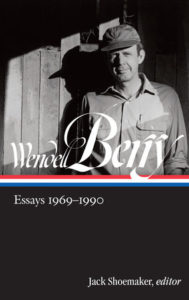
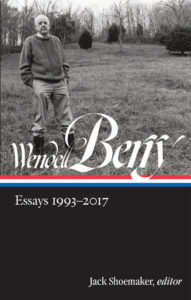
Wendell Berry: Essays 1969-1990 edited by Jack Shoemaker (Library of America) $37.50 OUR SALE PRICE = $30.00
Wendell Berry: Essays 1993-2017 edited by Jack Shoemaker (Library of America) $37.50 OUR SALE PRICE = $30.00
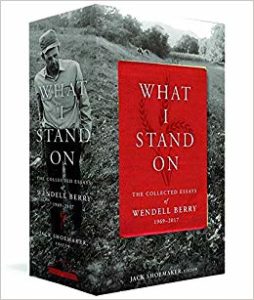 What I Stand On: The Collected Essays of Wendell Berry 1969-2017 Boxed Set edited by Wendell Berry (Library of America)
What I Stand On: The Collected Essays of Wendell Berry 1969-2017 Boxed Set edited by Wendell Berry (Library of America)
$75.00 OUR SALE PRICE = $60.00
 For those wanting to dip into Mr. Berry’s extraordinary fiction world – all of his novels and short stories are set within the membership of the same fictional Kentucky community, haphazardly scattered over more than a century — Library of America has published (and we have announced, previously) the first of a several volume set of his stories and novels, arranged, cleverly, in fictive, Port Williams historical order. That is, they are not chronological based on when Berry wrote or published them, but are ordered within the historical unfolding within Berry’s Port Williams world. We don’t know when the next volume is coming but this LoA is very, very nice.
For those wanting to dip into Mr. Berry’s extraordinary fiction world – all of his novels and short stories are set within the membership of the same fictional Kentucky community, haphazardly scattered over more than a century — Library of America has published (and we have announced, previously) the first of a several volume set of his stories and novels, arranged, cleverly, in fictive, Port Williams historical order. That is, they are not chronological based on when Berry wrote or published them, but are ordered within the historical unfolding within Berry’s Port Williams world. We don’t know when the next volume is coming but this LoA is very, very nice.
Wendell Berry: Port William Novels & Stories: The Civil War to World War II edited by Jack Shoemaker (Library of America) $40.00 OUR SALE PRICE = $32.00 This includes Nathan Coulter, Andy Catlett: Early Travels, A World Lost and A Place on Earth
+++
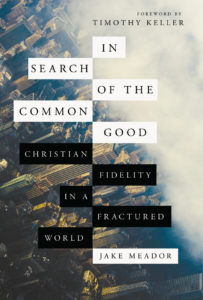
PRE-ORDER NOW
In Search of the Common Good: Christian Fidelity in a Fractured World by Jake Meador (IVP) $25.00 BookNotes 20% OFF = $20.00
Oh my, this is another one of those exceptional books that to describe well I simply have to use superlatives. In Search of the Common Good: Christian Fidelity in a Fractured World is a truly remarkable book and, yes, surely is in the running for one of the Hearts & Minds choices for the very best books of 2019. You can pre-order it easily by using our order form link shown below. We’ll deduct the 20% off BookNotes discount and send it out when it arrives the third week of June.
In Search of the Common Good travels some ground that other important authors have explored lately – which is a good thing, underscoring and adding to a often dense conversation about what ails our culture previously, as studied by the likes of James K.A. Smith, Alan Noble, Nancy Pearcey, and those who invite us to redemptive, human practices to counter the harsh pace of life and what Noble calls (in his Disruptive Witness) “our distracted age.” Several of these authors explain the heavy philosophy of Charles Taylor, who famously wrote the academic bestseller, The Secular Age (Harvard University Press; $22.95; our sale price= $18.36.) Although most church folks don’t think about it much, we need all the help we can get in discerning how this vital cultural criticism can help us navigate our days and be wise about what we do or don’t do as we lean into life here in the 21st century. In what ways have our imaginations been captured and in what ways do our ordinary assumptions and lifestyles pay homage to false gods and unhealthy attitudes and practices that don’t yield appropriate human and cultural flourishing? It’s a simple cliché, but what does it mean to “be the change” you want to see in the world.
It is surprising to me how – like fish that don’t even know they are in water – few of us study our culture, or think about it very seriously. We breathe in the toxic air, take up habits and values and ways of being in the secularizing, modernist world without too much self-awareness that it could be otherwise. We don’t (to harken back to the power of Walsh’s books) have much of a subversive faith that nurtures a truly Biblically-shaped social imaginary that enables us to say no to much. (“Be ye not conformed…” and all that from Romans 12:2, ya know.) Which is why books like this are so very important. And this one is happily not only insightful and important, but interesting and enjoyable and practical. Kudos!
Jake isn’t just piling on guilt about living at ease in the modernist world. And he isn’t just bemoaning the alienation and fracturing of our politics and neighborhoods and families; he helps us understand our cultural context and its damaging ways. He helpfully explains the thesis of Bowling Alone, for instance, and sounds maybe a bit like David Brooks at times, but shows that the complications of our times didn’t happen over night — he helpfully cites the brilliant Alan Jacobs’s book The Year of Our Lord: 1943: Christian Humanism in an Age of Crisis (Oxford University Press; $29.95; our BookNotes sale price = $23.96.) Interestingly to me, he cites, as I often have, Jacob’s insights on Jacque Ellul. In other words, this is a deep level critique – he’s not merely saying we should just use our cell phones less or be nicer in public. He is looking not only at symptoms of our discontent but the ethos of the age.
And, yes, he explains Charles Taylor. He does this in the clearest way I’ve read yet, I think. (Tim Keller’s one short chapter in Preaching: Communicating Faith in an Age of Skepticism [Penguin; $16.00 – our sale price = $12.80] about Taylor is succinct and clear.) This isn’t just an academic critique from ten thousand feet; Meador roots all of his insightful social analysis in real-world settings, with lots of entertaining stories about his parents, his home-town, and its social problems – okay, it’s no Hillbilly Elegy but he names all kinds of ways our modern society is deepening our divides, including domestic poverty and family hardships, in small towns and big cities.
He’s concerned about polarization, of course, and he’s hoping to bring a case for hopefulness to those who are anxious about the future of the church.
 Jake brings brilliant learning and fine writing (he is vice president of the brainy Davenant Institute and the editor-in-chief of Mere Orthodoxy) but he’s a real Wendell Berry buff, so he’s always down to Earth. His sense of place – and his invitation to us to deepen our own loyalties to our own places – is palpable. It may be because he’s a Husker from Nebraska and has seemingly fierce loyalties there. As Collin Hansen of the Gospel Coalition says of Meador’s writing, “You’ll see his characteristic combination of deep learning with an earthy touch.” That’s putting it mildly. There’s real dirt under this guy’s fingernails.
Jake brings brilliant learning and fine writing (he is vice president of the brainy Davenant Institute and the editor-in-chief of Mere Orthodoxy) but he’s a real Wendell Berry buff, so he’s always down to Earth. His sense of place – and his invitation to us to deepen our own loyalties to our own places – is palpable. It may be because he’s a Husker from Nebraska and has seemingly fierce loyalties there. As Collin Hansen of the Gospel Coalition says of Meador’s writing, “You’ll see his characteristic combination of deep learning with an earthy touch.” That’s putting it mildly. There’s real dirt under this guy’s fingernails.
And. man, he can tell a good story about how to smoke barbecue.
Lately, many Christian folks have shifted in how we talk about our work in the world (and I think it is a good thing.) Many are now talking about their efforts to love their neighbors well by describing commitments to the common good. We hear talk about civic virtue. There is even a fantastic group called “Made to Flourish.” Churches talk about being missional, not just sending missionaries, and we are learning to evaluate our North American culture, asking how its spirit and structures create systematic injustices and bad habits among us. These are all pretty nascent and it is encouraging to hear this kind of talk about social architecture and civil society and the common good. Jake is on the cutting edge of all this and his book will help us all.
The best of these efforts sound refreshingly neither old school left or right but something new, offering a counter-cultural witness, a city on a hill. We are wanting to live into that call from Jeremiah 29 to “seek the peace of the city where God has sent you.” This is all exciting and important and In Search of the Common Good helps us get a firm diagnosis and a vision for moving forward. It is indispensable for anyone wanting to think well about our time and place and what God is calling us to.
And, yes, he uses Wendell Berry a lot. He also cites Steve Garber (another Hearts & Minds favorite, as you surely know; if an author is reading Visions of Vocation: Common Grace for the Common Good it is a very good sign.) Timothy Keller has an excellent forward saying why this robust cultural analysis and this helpful guidance into being “in but not of” is so very good. I don’t say this lightly, but Keller’s foreword is nearly worth the price of the book.
Keller notes, by the way, that when he entered evangelical and Reformed pastoral ministry nearly forty-five years ago the lines of debate in conservative churches were largely theological in nature. He outlines in a sentence or two some of the issues that many argued about (and I felt the knot in my stomach as I read) but he observes that increasingly the fault lines between churches and the most vehement debates nowadays are about culture. “As I look around,” Keller says, “I see this same division roiling Christian denominations and organizations everywhere.”
And as our culture is weakening and fragmenting and the dissatisfaction with political leaders (and churches and other formerly respected institutions) wanes, we are increasingly moving towards very hard times. I assume you know this. Keller reminds us what Francis Schaeffer predicted decades ago: when a Christian consensus and fidelity to principles of justice and beauty and goodness erode we will be left with “personal peace and affluence.” And those who hold those values will be tempted to vote for leaders who will merely protect their privilege. This has long been a classic conservative argument, that as society is unmoored from deeper roots by (even well intended) revolutionary goals, we lose tradition and values and end up with just atomistic individuals doing whatever pleases them. And voting for those who will help them keep their stuff.
(An aside: Jake knows, I’m sure, but does not cite Abraham Kuyper’s political strategist, Groen Van Prinsterer, and his book exposing the terrible cultural consequences of the spirit of the French Revolution entitled Unbelief and Revolution, now out in a newly translated edition by Harry Van Dyke (Lexham Press; $15.99 – our sale price = $12.79.)
So, as Jake illustrates (without pressing this exact point) we need something more profound than a left wing critique or a historic conservative critique; both have true insights but neither are adequate. We need some (Berry-esque, neo-agrarian?) vision that can point out problems with “both sides” of our cultural ideologies. On some pages of In Search of the Common Good Meador sounds pretty darn conservative (and he is pretty traditionalist on matters of family and sexuality) and on other pages he rails against unjust income disparities and institutional racism. He’s clearly no socialist, but he’s hard on right-wing, free market capitalism that isn’t moderated by values of the common good. In this, he might offend older conservative types, but he seems to have the church fathers and the best Christian scholars over his shoulder, so this is no facile jive.
Indeed, he bolsters his critique of the economic gods of progress and growth by citing the likes of Augustine, Aquinas, and Calvin. These and other church fathers and doctors are bold in applying God’s concern for justice in our economic practices. He isn’t bombastic at all – his calm and gracious tone is a plus in this book – but he shows how if one is standing in the traditions and values the great church tradition, not the secularized world of modernism, it is not uncommon to question unfettered capitalism, unjust interest rates, and talk of unqualified private property. He quotes the classic, conservative, Catholic, Acton Institute’s journal Morality & Markets but not Sojourners. (He does love Oscar Romero, and quotes him from time to time. Presente!)
Yep, he exposes the weaknesses of the foundations of the modern world’s worldview – John Lock does not fare well, for instance. Jake invites us through careful and helpful historical teaching, to be aware that our modern world and the social visions and values that emerge from it, are not neutral, but may be rooted in bad thinking about God and about God’s creation.
He tells us, in other words, how we got ourselves into this mess. Like a serious doctor giving a diagnosis, nothing cheap will do. So he goes deep and gives us the bad news.
One senses a lot of hopefulness, though and joy, even, because once we are clear how urgent the stakes are and how radical the treatment must be, we can get going, moving in what the old liturgies call “the newness of life.” This book will help you live that way.
Jake is young and idealistic and has a healthy small church and good friends who, together, are forging a new way of being faithful to God in their daily lives. They are deeply involved in church, in each other’s lives, and they serve others beautifully. I have rarely read a book that has such a delightful survey of deep philosophical currents and which is also so lovely in being down to earth.
And this exact thing is a key insight for In Search of the Common Good: Christian Fidelity in a Fractured World, being down to Earth, I mean. He offers good practices to restore our sense of wonder, inviting us to regain a child-like appreciation of the joy of small things.
Get this: in a way, our culture, especially since the Enlightenment and the start of the so-called modern age, has moved towards increasing fragmentation. You know that Yeats poem warning that “the center will not hold.” Things are falling apart, and our lives seem not to cohere. We wear so many hats and can hardly imagine being whole, seamless. We feel like different people at work and church and home; some days it feels like we should just drop out and watch Netflix. Many of us hardly even know our neighbors. Our suburban ennui is felt even in small towns and rural spaces and it is palpable. Our very streets and housing designs and habits of commuting and such preclude a holy life of simple service to neighbors. What in the world does the common good look like in a cul de sac?
(Ahh, that’s a good part of the splendid book Finding Holy in the Suburbs: Living Faithfully in the Land of Too Much by Ashley Hales [IVP; $16.00] a lovely, well-written book that would make a nice companion to Meador’s search for “fidelity in a fractured world.”)
Some of all this exhausting trouble is caused by the (over) specialization that leads to abstraction, living in our heads, failing to engage the real world around us, as Matthew Crawford writes. You should know the motorcycle repairman Crawford’s splendid works on manual work, Shop Class as Soul Craft: An Inquiry into the Value of Work (Penguin; $17.00) and The World Beyond Your Head: On Becoming an Individual in an Age of Distraction (FSG; $16.00) both of which Jake Meador effective cites.
To wit: Jake points us in new ways to get, literally, more down to Earth. We can fight incoherence and alienation and abstraction by slowing down. He doesn’t cite the aforementioned Alan Noble but Alan’s brilliant study of how our phones and tablets these days add to this is essential, here. His Disruptive Image is a kissing cousin to In Search of the Common Good. Alan probes our fast-pace habits through the lens of Taylor, but Jake takes us back a bit further, looking at how our utter individualism, enshrined in some of our American civic documents and our revivalist religions, drove capitalism and disruption and abstraction.
SUMMARY OF THE BOOK
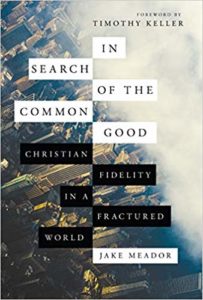 The first half of In Search of the Common Good is a vital and compelling few chapters – about 30 pages – on “The Breakdown of Community.” He explores what he calls “the passing of the American church” and then explains, brilliantly, “the unwinding of common life in America.” You know this stuff in your bones, but we need words to say it, and we need some sense of why we’re experiencing this unprecedented unwinding. It is very good writing; I was engaged from the beginning. And it offers a view that isn’t alarmist, but is urgent.
The first half of In Search of the Common Good is a vital and compelling few chapters – about 30 pages – on “The Breakdown of Community.” He explores what he calls “the passing of the American church” and then explains, brilliantly, “the unwinding of common life in America.” You know this stuff in your bones, but we need words to say it, and we need some sense of why we’re experiencing this unprecedented unwinding. It is very good writing; I was engaged from the beginning. And it offers a view that isn’t alarmist, but is urgent.
PART TWO
Part two looks seriously at three problems that emerge when we live in “a secular age” and these are all at a crisis point, it seems. They emerge from our age, but they become problems, or obstacles, then, that keep us from experiencing authentic community. So this stuff isn’t just armchair theorizing about Descartes and Locke and secularization, these are keys to why we don’t have abundant life. The chapters are on the loss of meaning, the loss of wonder and the loss of good work. I have to say I cried through some of this — in part because I was so glad to hear these words so plainly put, translating my own decades of reading about the roots of Western culture and the idols of our age. I was strongly moved by this, being reminding of very important concerns.
Reading, as he does, old theology and Wendell Berry, citing Oscar Romero next to Oliver O’Donovan, studying the Word and the world in this way allows you to become a wise voice like Meador. He names these losses in the modern age and it is good to hear, painful and tragic as it may be.
So that’s the first half of the book — two big parts of diagnosis, as succinct and clear as nearly any such social critic I’ve read. He’s drawing on Jamie Smith and David Brooks and Steve Garber and Stanley Hauerwas, leavening it all with spot-on reminders of poignant scenes from Mad Men or Camus novels. I love how he cites an indie-rock singer songwriter on one page and John Keats on another. And I love that he quotes Matthew Dickerson’s Narnia and the Fields of Arbol (University Press of Kentucky; $70.00 – our sale price = $56.00) exploring the ecological vision of C.S. Lewis. And he nicely retells a scene or two from a Wendell Berry novel. What fun!
PART THREE
This is a short book, so the second half is not even 100 pages, but in it he invites us to quite a lot. In Part Three Meador explains the why and how of Sabbath, church involvement, “the membership” and good work. These chapters are under the heading of “the practice of community” and it is – contra the neo-monastic movement or the Rod Dreher Benedict Option proposal – a broad and generous vision of church and neighborhood and workplace. We are called into community – membership is Berry’s potent word – in and for the world, so we dare not view community as merely our small group or intentional household or congregation.
I would like to write more about this (and I might) but his short chapter “Work” is nothing short of prophetic. It is one of the finest explorations of faith and work in the modern work-world that I have read. He shows how an increasing facelessness and inhumanity surrounds us – shades of Jacque Ellul, again, and his critique of how we overvalue and overdo technique and speed and efficiency. He calls the current faith/work movement to explore good and meaningful labor in humane and healthy workplaces that are socially just and serving the common good, which will mean seeking a human-scale sort of inefficiency. I have to say I felt rather validated with our down-home approach and older-school website, since it certainly forces us to correspond with our mail-order/on-line customers, honoring them with real chat and (yes) honest mistakes. That Meador says we should be thoughtful and intentional about what kind of businesses we support is precious. I take it he tends towards a “buy small” approach, supporting local economies and mail-order places whose values are consistent with Kingdom ways. (As you know, it is our opinion that this generally precludes working with Amazon, faceless and greedy as they are.) In any event, this chapter is provocative and wise and influenced by the right sorts of cares and concerns. It is what Steve Garber would call “morally serious.”
PART FOUR
Part Four of this fine book is called “The Promise of Community” and there are two chapters. One is a bit heady called “Political Doctrine and Civil Virtue” and it is needed now more than ever. As he should, Meador cites David Koyzis and his new 2nd edition of Political Visions and Illusions: A Survey & Christian Critique of Contemporary Ideologies (IVP Academic; $33.00 – our sale price = $26.40.) He is asking hard questions about what a Christian commonwealth might be like and how Christian societies might emerge. This will, necessarily, involve repentance and sacrifice.
He’s got lots of spicy illustrations and good quotes – such as the fabulous piece by film critic Alissa Wilkinson “View and Worldviews” that was in Comment magazine some years ago. Some of this chapter is just sensible stuff – distinguishing between political doctrine and policy, for instance. For a short chapter it is very wise, the kind of thinking we’ve seen in the author’s Mere Orthodoxy blog.
Mr. Meador, as I’ve suggested, doesn’t fit the typical patterns for worldly American political culture and their ideological leaders (or the worldly churches that have lined up often unquestioningly right or left behind them.) I suppose this is partially because he is so rooted in a Christian democratic appeal that is in part-pre-modern, taking hints for contemporary citizenship through a lens of Augustine and Aquinas, Luther and Calvin. I know he studies the likes of Abraham Kuyper. (And, for those who relish obscure stuff, his colleague at Davenant, Brad Littlejohn, is a Richard Hooker scholar and what we here in central Pennsylvania celebrate as “Mercersburg Theology.” Jake is well read and wide-ranging, for sure. And did I mention he likes Wendell Berry?)
So, he’s neither right nor left, although – for (admittedly inadequate) shorthand, we might say he sounds at times like those classic conservatives that are “Never Trumpers.”(It is a phrase coined specifically about anti-Trump conservatives, by the way, regardless of how often the President misuses it to include all of his opponents.) Meador cares about place and beauty and integrity and family and order and competency and joy and sacraments and grace and kindness and, well, who can support a leader who despises these deeply Christian values? Again, his vision of citizenship is not left-leaning or liberationist but is gracious and humane, maybe the sort of stuff one might catch at the Front Porch Republic. He tends to talk about covenants, not contracts; the common good, not individual rights; like the Bible, when talking about politics, he talks more about public justice than individual freedom. He is interested in nurturing among us a long-haul sort of discipleship that creates good neighbors and good citizens.
And so, in a very important section, he asks “Where Do Good Citizens Come From?” Of course, some of his answer comes from his loyalty to place, to the local church, to Word and Table, to the small practices that he highlighted earlier. Those who trust God by keeping Sabbath and who are in communion with local folk in church and neighborhood and workplaces, those who are full of wonder and joy will necessarily embrace their civic duties with a sort of wisdom that isn’t ideological. They will care about peacefulness and neighborliness and solidarity.
Yes (he reminds us) when considering politics we have to think of policy. But policy proposals are often ambiguous, proximate; good people can disagree. He reminds us, though, that policy isn’t everything – Kuyper’s “sphere sovereignty” and the Catholic notion of “subsidiary” call us to a more multi-dimensional view of civil society, of the value of other voluntary associations other than the state (the arts, businesses, non-profits, sports teams, neighborhood groups, churches, and such), and that civic membership includes much more than politics, proper. He does not use this to justify a right-wing absolutization of some idea of “small government” but he does help us evaluate what the government can and should do. It’s brief but a very helpful section.
THE ETERNAL CITY
The final chapter is a big picture look at the promises of “The Eternal City” and he starts with a lovely story of a child’s longing to be in Narnia. Indeed, it may be that heaven is very much like Narnia, a world restored, a garden healed, a renewed creation. I am so glad he does some direct exegesis (of the mistranslated and misinterpreted 2 Peter 3:10, for instance) insisting that God is not going to destroy the world. He quotes Robert Farrar Capon and Al Wolters and he could have easily cited the splendid When the Kings Come Marching In: Isaiah and the New Jerusalem by Richard Mouw (Eerdmans; $15.00; our sale price = $12.00.) This is new creation theology and visionary hope that thrills me. I hope it thrills you.
I love how it ends with his own love of the stories of The Hobbit. He tells of a painting they own that reminds his family of the song Bilbo Baggins was so fond of singing, “The Road Goes Ever On and On.”
Meador writes:
It reminds us that the road runs right to our very door, and that road might take us anywhere and toward anything. It reminds us that there are no boring places in God’s world – no boring people, for that matter. It reminds us that God stands over and above his creation calling us further up and further in. The road will lead to a cross. But only things that die can be resurrected. And so as sure as the road leads us to the cross, in leads us to the eternal city, to the home of a king, to the desire of all nations, to the joy of every longing heart.
That is the sort of Tolkien-esque, virtuous, costly, hopeful, adventure a deep Kingdom vision that serves the common good might evoke. This righteous concern for the rhythms of creation and common good is growing among us, and realizing the obstacles and challenges and Biblical guidance is urgent. Whether you are younger older, evangelical or more mainline, a quieter type or a missional activist, I think In Search of the Common Good: Christian Fidelity in a Fractured World by Jake Meador will be a great companion on your journey. Order it today.
BookNotes

SPECIAL
DISCOUNT
20% OFF
ANY BOOK MENTIONED
+++
order here
this takes you to the secure Hearts & Minds order form page
just tell us what you want
inquire here
if you have questions or need more information
just ask us what you want to know
Hearts & Minds 234 East Main Street Dallastown PA 17313
read@heartsandmindsbooks.com
717-246-3333
